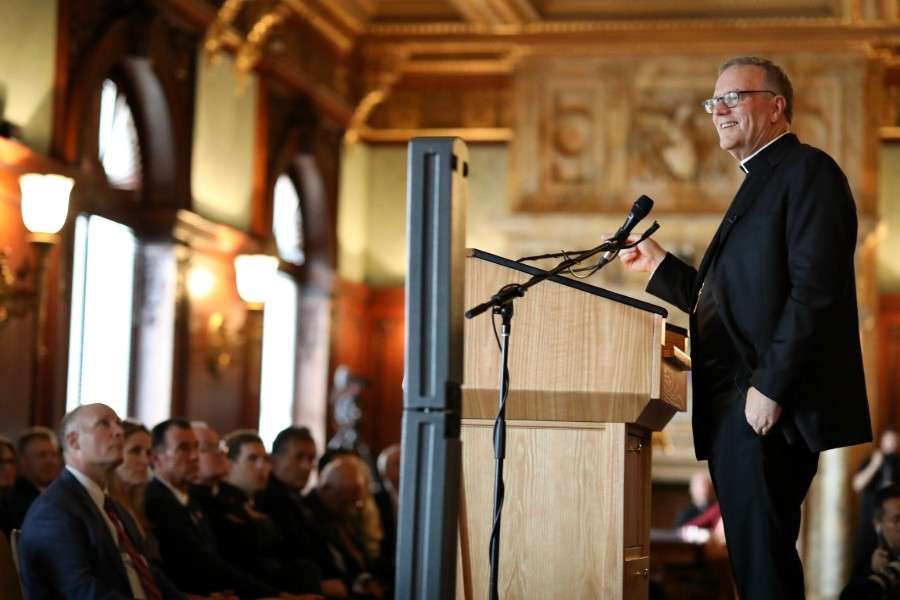Lawmakers must rediscover their call by God to pursue justice, Bishop Robert Barron told members of Congress and staff on Tuesday.
“In Catholic theology truth itself, goodness itself, justice itself, are simply names for God,” Bishop Robert Barron, auxiliary bishop of Los Angeles, said to an audience of members of Congress, staff, and others at the Library of Congress in Washington, D.C. on Tuesday.
The bishop told legislators that they were right to think of their role pursuing justice through public service as a vocation, and they were really called by God to do so.
“When you were seized by a passion for justice, I would say you were called by God at that moment,” Barron said.
Barron addressed an audience of several dozen people in the Members Room of the Library of Congress on Capitol Hill, on the vocation to public service.
Rep. Tom Suozzi (D-N.Y.) hosted the event, along with Rep. John Moolenaar (R-Mich.). Members in attendance included Sens. Bob Casey (D-Penn.) and James Lankford (R-Okla.), as well as Reps. Suozzi and Moolenaar, Reps. Dan Lipinski (D-Ill.), and Andy Harris (R-Md.).
Barron also delivered the opening prayer on the U.S. House Floor on Wednesday, to start the legislative business for the day. In his invocation, he echoed themes of justice that he had spoken about the previous day.
“O God, Source of all justice, You have summoned everyone who works in this chamber to walk the path of righteousness, to foster life and liberty, to care especially for the poorest and most vulnerable in our society,” Bishop Barron said.
“Free these servants of yours O Lord, of all those attachments to wealth or power or privilege or fame that would prevent them from following the course You have set out for them. Make them mindful of the time when they first heard your voice and followed it with idealism and enthusiasm,” he prayed.
In his discourse on Tuesday, Bishop Barron clarified at the outset that he would avoid discussing “hot button issues” with the members, such as abortion or marriage.
Such issues are important, he said, but could ultimately distract from “really deep and abiding points of contact between what I call the spiritual condition and political tradition.”
Barron challenged those in the room to rediscover the time when they found their vocation to public service. He said he asks priests to “remember when you first heard the call,” adding that “you will find, I wager, a moment of extraordinary clarity and spiritual power.”
Such a challenge, he added, involves “everybody in this room,” and a “sense of being called, summoned, sent on a mission, I think applies to everybody in our culture.”
The vocation to public service should be so all-encompassing, he said, that lawmakers should even remember when they were called. The prophet Isaiah, he said, dated his call to the prophetic vocation to “the year King Uzziah died,” Barron said, citing the Book of Isaiah in the Bible.
“In other words, it was burned into his memory because it was the defining moment of life,” Barron said, before asking lawmakers “what was, for you, the ‘year Uzziah died’?”
There are three transcendentals that culture is based upon, Barron said, the “true,” the “good” and the “beautiful.” Politics, he said, is especially connected to the “good.”
Barron exhorted members of Congress “to find it, to fight for it, to propagate it.”
“What animates that work?” he asked rhetorically of the pursuit of the “good” of those in public service. “It’s a passion of justice that lies at the bottom of the soul,” he said.
God called those in public service through a desire for justice, he said, emphasizing the need for “bringing our lives into harmony with the integrity and beauty of that call” where “everything I do is about serving justice.”
That, he warned, might make members “unpopular,” “less rich,” or see them “attacked.” However, he added, “The way you measure life now is how you respond to this call.”
Barron also mentioned the rise of the “Nones,” or those unaffiliated with any religion. Pew Research numbers the other week showed that the “Nones” now make up 26 percent of the overall U.S. population.
“Are we losing a sense of the sacred and divine dimension of life? I think demonstrably yes,” Barron said.

